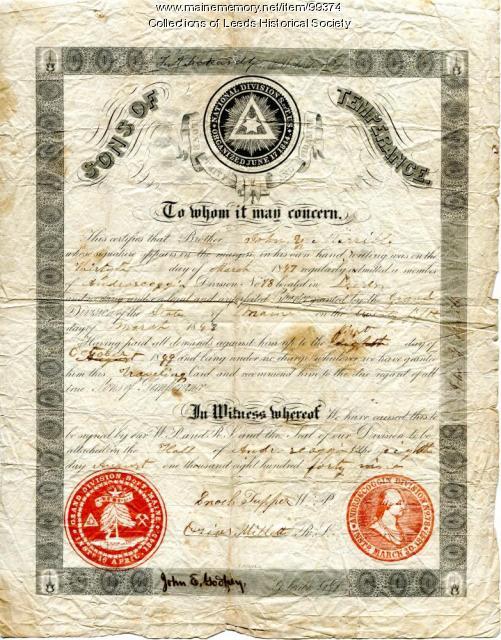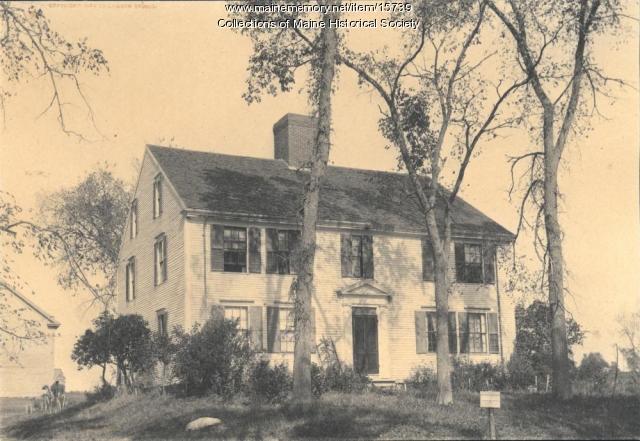Keywords: sons
Item 99374
Sons of Temperance certificate, Leeds, 1847
Contributed by: Leeds Historical Society Date: 1847-03-30 Location: Leeds Media: Ink (printer and pen) on paper
Item 13361
William Fox and Sons, Houlton, ca. 1895
Contributed by: Aroostook County Historical and Art Museum Date: circa 1895 Location: Houlton Media: Photographic print
Item 56818
31 Grant Street, Portland, 1924
Owner in 1924: McCann & Sons Use: Dwelling - Three Family
Item 36421
89 Pine Street, Portland, 1924
Owner in 1924: J.B. Brown & Sons Use: Dwelling - Single family
Item 151572
J. B. Brown & Sons alterations on Pine St., Portland, 1919
Contributed by: Maine Historical Society Date: 1919 Location: Portland Client: J. B. Brown & Sons Architect: John Calvin Stevens and John Howard Stevens Architects
Item 151571
J. B. Brown & Sons store alterations, Portland, 1916-1917
Contributed by: Maine Historical Society Date: 1916–1917 Location: Portland; Portland Client: J. B. Brown & Sons Architect: John Calvin Stevens and John Howard Stevens Architects
Exhibit
A Soldier's Declaration of Independence
William Bayley of Falmouth (Portland) was a soldier in the Continental Army, seeing service at Ticonderoga, Valley Forge, Monmouth Court House, and Saratoga, among other locations. His letters home to his mother reveal much about the economic hardships experienced by both soldiers and those at home.
Exhibit
Student Exhibit: Benedict Arnold's March Through Skowhegan
Benedict Arnold arrived in Skowhegan on October 4th, 1775, and it was here that Arnold received his first offer of help from the colonists. Joseph Weston and his sons helped Benedict Arnold and his army cross over the Skowhegan Falls, but Joseph later got a severe cold from exposure and died of a fever on Oct.16th. His sons went back to the family home along the Kennebec for they were the first family to settle in Old Canaan or what is now Skowhegan.
Site Page
Farmington: Franklin County's Shiretown - Four sons of Jacob Abbott, Farmington, ca. 1865
"Four sons of Jacob Abbott, Farmington, ca. 1865 Contributed by Farmington Public Library Description The four adult sons of Jacob Abbott."
Site Page
John Martin: Expert Observer - Junior Martin in cadet uniform, Bangor, ca. 1871
"… (1823-1904) drew three illustrations of his son as a cadet, and wrote, "Junior was 14 years ..."
Story
Making the wapi-kuhkukhahs / Snowy Owl basket
by Gabriel Frey and Gal Frey
A story of a mother and son artistic collaboration.
Story
Langdon Burton and the Cold, Wet Tourists
by Phil Tedrick
A father and son have their vacation experience totally changed by an encounter with a fisherman
Lesson Plan
Longfellow Studies: The Elms - Stephen Longfellow's Gorham Farm
Grade Level: 6-8, 9-12
Content Area: English Language Arts, Social Studies
On April 3, 1761 Stephen Longfellow II signed the deed for the first 100 acre purchase of land that he would own in Gorham, Maine. His son Stephen III (Judge Longfellow) would build a home on that property which still stands to this day. Judge Longfellow would become one of the most prominent citizens in Gorhams history and one of the earliest influences on his grandson Henry Wadsworth Longfellow's work as a poet.
This exhibit examines why the Longfellows arrived in Gorham, Judge Longfellow's role in the history of the town, Henry Wadsworth Longfellow's vacations in the country which may have influenced his greatest work, and the remains of the Longfellow estate still standing in Gorham today.
Lesson Plan
Longfellow Studies: "Evangeline: A Tale of Acadie"--Selected Lines and Illustrations
Grade Level: 6-8, 9-12
Content Area: Social Studies, Visual & Performing Arts
Henry Wadsworth Longfellow, Maine's native son, is the epitome of Victorian Romanticism. Aroostook County is well acquainted with Longfellow's epic poem, Evangeline, because it is the story of the plight of the Acadians, who were deported from Acadie between 1755 and 1760. The descendants of these hard-working people inhabit much of Maine, New Brunswick, and Nova Scotia.
The students enjoy hearing the story and seeing the ink drawings. The illustrations are my interpretations. The collection took approximately two months to complete. The illustrations are presented in a Victorian-style folio, reminiscent of the family gathered in the parlor for a Sunday afternoon reading of Evangeline, which was published in 1847.
Preparation Required/Preliminary Discussion:
Have students read "Evangeline A Tale of Acadie". Give a background of the Acadia Diaspora.
Suggested Follow-up Activities:
Students could illustrate their own poems, as well as other Longfellow poems, such as: "Paul Revere's Ride," "The Village Blacksmith," or "The Children's Hour."
"Tales of the Wayside Inn" is a colonial Canterbury Tales. The guest of the inn each tell stories. Student could write or illustrate their own characters or stories.
Appropriate calligraphy assignments could include short poems and captions for their illustrations. Inks, pastels, watercolors, and colored pencils would be other appropriate illustrative media that could be applicable to other illustrated poems and stories. Each illustration in this exhibit was made in India ink on file folder paper. The dimensions, including the burgundy-colors mat, are 9" x 12". A friend made the calligraphy.




















